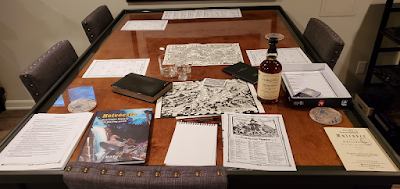Having wrapped up our Masks of Nyarlathotep game, we met this week to begin our Helvéczia game. A month or so ago I pitched the game as one of three options for the group, and they were unanimous in choosing it. None of my players were familiar with the game at all, but my short description was: "17th century fantasy Switzerland. Rapier duels, early black powder weaponry, dark comedy religious strife. Sort of a mix of Three Musketeers, Princess Bride, and Solomon Kane." I've been digging more into the recommended reading M. Lux provides - Dumas, Grimm, Hoffman, and Grimmelshausen have been added to my library and greedily consumed, but I've also found good inspiration in Voltaire, Maupassant, and Mortimer's guide to Restoration Britain - I would love to see a similar book for the continent. But I've found plenty of touchpoints to reference when explaining the rather niche setting and my players have been enthusiastic about it.
Our character creation generally followed the checklist provided. Ability scores rolled in two sets, a group discussion about the peoples and classes of Helvéczia, determination of all the stats, shopping for equipment, and then a short discussion on the group's origin. Character creation could easily be done in ten minutes if you wanted, but we spent the two hours we'd allotted to the evening, using the time to discuss details of the setting and system, and to share a Balvenie 12 year.To aid reference, I did print out a sheet summarizing the different inhabitants of Helvéczia, as well as the equipment tables. I likely should have printed the list of character skills as well, since that section did slow us down as we had to take turns referencing the book.
The one deviation I made from the book's character creation steps is with regards to starting virtue. My players had chosen both a Student and a Cleric so I allowed the former to roll his virtue with a 2d6+1 while the latter rolled a 2d6+6, so neither would begin the game in a state of virtue that deprived their starting spells.
The Troupe
Gerard Toussant, French Duelist
Monsieur Toussant is an energetic and charismatic man, a talented musician and swordsman. He is suave and often mischievous, and as likely to infiltrate the highest courts of the land as to end up in a duel with a magistrate over a lady's honor.
Francesco Jasso, Italian Cleric
Signore Jasso is a man of unshakable faith, both in God and in his own fortunes. As such, he is easily engaged in worldly comforts, particular games of chance, certain that his mastery of theology and penance will always lead him back into the graces of the church.
Filip Bartos, Czech Student
Pane Bartos' upbringing was as cloistered as a nun's, but his was in the great libraries and academies of Prague. A brilliant mind for the sciences also led him into the more esoteric studies of the occult, and drove him to further his discoveries. A little awkward in social circles, he is still able to engage in the best oration when the topic is within his field of studies.


No comments:
Post a Comment